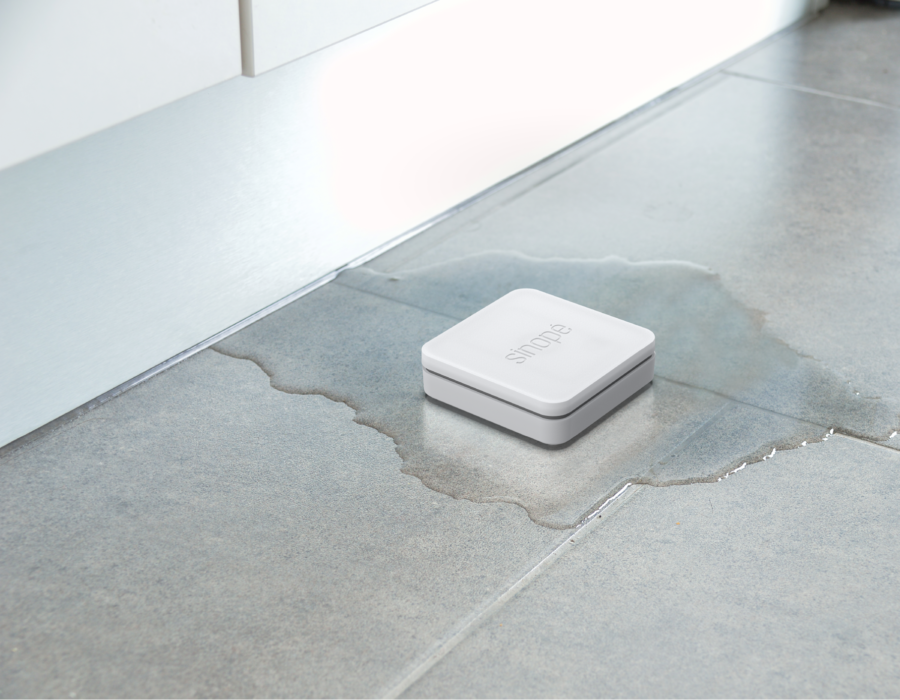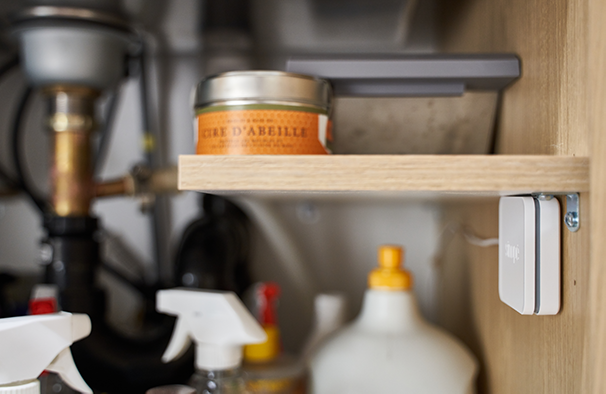Your cart is empty.


Water damage is much more frequent than people think. Here are five anecdotes that our team experienced, how they could have become a homeowner’s nightmare, and the following steps to avoid these mistakes from repeating.
In Canada, water damage represents 47% of all home insurance claims. In the U.S., water damage is the third most-costly type of home insurance claim. However, many such incidents are not claimed to insurers. And for a good reason: as experts point out, complaining to your insurer is not always a good idea. It increases the annual costs in the years following the claim and could cause you to lose the “claims-free” bonus.”
Yet just because water damage goes unclaimed doesn’t mean it doesn’t generate a cascade of swearing, expense, loss, and unpleasant moments. Using a smart water damage protection system could easily avoid such unfortunate consequences. Reliable and affordable, this solution could save you a lot of headaches.
Getting interrupted in the middle of an action is common. How many times a day are we distracted while trying to complete a task?
These interruptions are often inconsequential…but not always!
This is what happened to one of our design team members.
The doorbell rang as he was filling the kitchen sink and about to do the dishes. Thinking the interaction would be quick, he lets the water flow and hurries to answer the door. Classic.
It was the neighbour who wanted to discuss various neighbourhood topics. Twenty minutes later, they are still chatting. Time flies….and the water keeps running from the open tap!

Caught up in the conversation, he had completely forgotten about it. Meanwhile, the kitchen sink fills up and eventually overflows.
At the end of his chat, our colleague returns to the kitchen and has both feet in the water. He had forgotten entirely about the dishes!
Fortunately, a sink running for 20 minutes is not enough to call a water damage patrol.
That’s just enough for all the towels in the bathroom to go through to soak up the mess.
He could have been informed of the situation if he had placed a smart water leak detector nearby. As a bonus, the sensor would have sent the command to automatically close the main water inlet connected to a smart valve. In short, there would have been no damage at all!
A similar story happened at the Le Savignon residence in the Lachine sector of Montreal, to name only one. One of the co-owners was filling the sink to do the dishes.
Unfortunately for this person, the consequences were disastrous.
The co-owner got distracted…then went to bed for the night.
The faucet ran like this for hours. It was more than just a puddle on the ground when the co-owner woke up. The units below the condo had also been affected.
Since the incident, and a few others, the co-owners of this building have all installed a water damage protection system with which they are satisfied.
If you have young children, you know these adorable little creatures are full of ideas for 1) creating new games and 2) achieving their goals.
One of the engineering department members at Sinopé learned it the hard way. His two daughters were old enough to shower alone but young enough to enjoy playing in the water.
One had the brilliant idea of blocking the shower drain with a washcloth to create a pool.
Meanwhile, no one downstairs suspects what’s going on upstairs. Corner showers take little time to fill up and overflow…
Eventually, they realized it when the water got to them.
Unfortunately, in their case, the bill was high. They had to replace the floor and redo the ceiling because the water had managed to damage them.
A well-placed water leak detector would have emitted an alarm and sent a push notification, allowing them to avoid this annoying situation.

A sump pump is an appliance used to remove accumulated water from the collection basin commonly found in the basement of homes.
This pump, found in basements, is generally activated during rainy weather or snowmelt in the spring.
However, if it fails because it is broken, blocked, or due to a power failure, the consequence manifests quickly.
A member of our team experienced such a situation.
One of our communications and marketing coordinators was still living with her parents when this happened. It was a rainy day. Before going to bed, her father had the idea to go downstairs to ensure the sump pump was working appropriately.
He was lucky in his misfortune since the overflow was imminent. The sump pump had stopped working.
Their family, helped by friends, spent part of the night restoring the situation to avoid the worst. Stress, fear, fatigue.
Because nowadays, what do we find in the basement? Many things.
A living room, often the home theatre. Due to a lack of storage space, many items are stored directly on the floor.
If this father had not thought to go and check the sump pump, he would have been quite surprised when he saw the flooding.
Once again, a water leak detector is essential in this kind of place.
We recommend using a waterproof smart water leak detector that can be submerged without damage.
One of the benefits of using a smart device is the ability to always confirm device operation. For example, the Neviweb application designed by Sinopé Technologies shows the battery status of the water leak detector.
For our Communications Advisor, optimizing time is of the essence.
The washing machine is programmed to work while she is away so that the load is ready for the dryer when she returns from work, the slow cooker is started in the morning, and sometimes, even her oven’s ”cook time” feature is used. Hence, her meals are ready upon her return.
Of course, the dishwasher is no exception. Before leaving the house, it is programmed to run so that everything is washed in her absence.
Except that our communications advisor lives in the countryside, and her water is hard, despite using a softener. What a surprise when she came home one day and realized that the dishwasher had leaked because the pipes, over time, had become clogged due to the limescale that had formed there?
For a person who likes efficiency and productivity, nothing is more frustrating than spending an hour (and more!) picking up a mess in front and behind the appliance, in addition to the water leaking under the cabinets.
As a bonus, of course, it damages the furniture! Not enough to replace it…but enough to annoy.
Our communications advisor would have benefited from slipping a water leak detector under the dishwasher. In addition, thanks to the automations available in Neviweb, the water would have triggered the closing of the valve in addition to turning off the dishwasher so that it does not run empty thanks to the smart in-wall outlet. All this while sending a push notification to her smartphone.

The mother of our communications advisor went through a similar situation. Tenant in a well-located building that has seen more than one spring in Sherbrooke, our colleague’s mother started the washing cycle of her dishwasher, then settled in for a good read in the living room.
Thirty minutes later, the doorbell rings while the cycle is still in progress. The tenant from the unit below came to ask about the water coming from the ceiling in his apartment.
Old plumbing often leads to clogged drains, and that’s what happened.
In her case, as a tenant, she was not responsible for assuming the costs related to the repairs caused by the water damage.
That said, the company that owns the building will no doubt be curious to explore a MESH-type solution explicitly designed for multi-housing properties.
After moving into her new house, one of our colleagues had the pleasure of hosting her sister-in-law for a few days. She was housed in the basement, where she could benefit from a bedroom and a private bathroom.
As is the case for most people, bedtime includes a trip to the bathroom.
In the morning, however, a surprise awaits them. There was a problem with the toilet, and it had overflowed and flooded the room all night. Thanks to the well-placed drain in the basement, the water was drained away little by little, thus limiting the damage. They were able to mop up the rest with towels.
Luckily, the water did not reach the adjoining living room, which would have destroyed the floating floor and possibly damaged some furniture.
In this case, this type of water leak detector could have saved them a lot of hassle.
Overflowing toilets are commonplace, even when the plumbing and the toilet are brand new.
In addition to the anecdotes reported, water damage can occur in a wide range of situations.
A water leak can form in a wall or ceiling following a freeze or when the piping is damaged.
The Insurance Bureau of Canada provides several smart tips and tricks to avoid water damage.
You can change the seals at the slightest sign of wear and replace the rubber hoses of appliances with more resistant and durable ones. Of course, it’s also best not to run your appliances when you’re away.
Changing the water heater every ten years and avoiding storing valuables in the basement is also recommended.
All of this sensible advice seems obvious. In theory, we should all maintain our homes properly and regularly.
However, the best maintenance gestures are not accomplished due to a lack of time or knowledge.
In practice, these actions are taken reactively rather than proactively. This means we tend to take these actions after water damage, not before it occurs.
A proper water damage protection system will not prevent your water heater from breaking. On the other hand, it will prevent your damaged water heater from damaging your home.
And that’s what is essential.
Water damage is much more common than you think and is often caused by a trivial incident or an oversight. The consequences are sometimes minimal but can quickly become nightmarish.
You can take to reduce the risk of water damage. Despite maintenance and all the goodwill in the world, these can still happen.
Suppose you can’t prevent your water heater from breaking. In that case, you can still prevent it from turning into a mess thanks to a smart water damage protection system.
You can withdraw your consent at any time. Pour For more details,
see our Privacy Policy ou Contact Us.